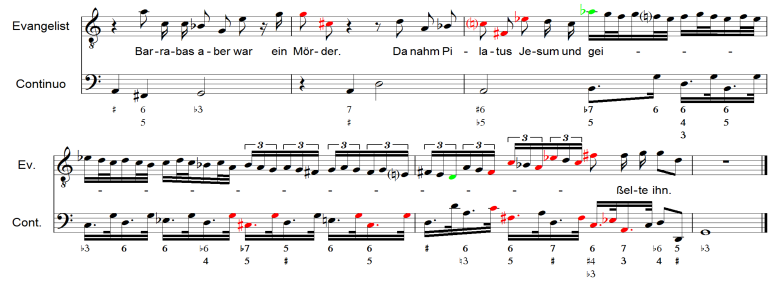This chorale is stanzas eight and nine from Herzliebster Jesu – the chorale used for no 3 – but this time in a higher key. It marks the start of the palindromic structure as discussed earlier (see diagram A1). It has a stately “walking” bass part which adds a certain grandeur and majesty to the music.
|
27 |
Chorus Chorale |
Ach, großer König, groß zu allen Zeiten, wie kann ich gnugsam diese Treu ausbreiten? Keins Menschen Herze mag indes ausdenken, was dir zu schenken. Ich kann’s mit meinen Sinnen nicht erreichen womit doch dein Erbarmen zu vergleichen. Wie kann ich dir denn deine Liebestaten Im Werk erstatten? |
Oh, great king, great for all time, how can I adequately proclaim your faithfulness? No human heart can imagine what we should give to you. My mind is incapable of imagining anything with which to compare your compassion. How can I then repay your acts of love with my deeds? |
This time the response of the chorus is short and terse, and does not hold up the drama which is becoming ever more urgent. Note the final words of the evangelist in movement 30, and the incredibly graphic way in which Bach sets the word geißelte (scourged – whipped with leather cords), accompanied by a jagged and ugly bass line. This passage features no fewer than twelve appearances of the tritone and one of the diminished seventh. These appearances are indicated in the extract below by red notes. The word geißelte is set to a long tortuous melisma, which winds down from a high A flat to a low D (itself describing the same tritonic interval as indicated by the green notes), before leaping up again at the end of the phrase by the use of three ascending and sequential tritones.
